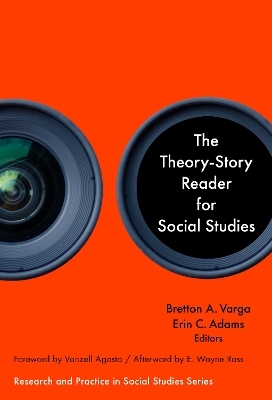
The Theory-Story Reader for Social Studies
Teachers' College Press (Verlag)
978-0-8077-8640-6 (ISBN)
- Lieferbar (Termin unbekannt)
- Versandkostenfrei innerhalb Deutschlands
- Auch auf Rechnung
- Verfügbarkeit in der Filiale vor Ort prüfen
- Artikel merken
Theory holds the capacity to help educators see the world differently, challenge problematic assumptions and practices that cultivate harm, and illuminate pathways toward access, equity, justice, joy, and love. While it is easy to underestimate the role of theory in such pursuits throughout social studies education, this book shows that theory is always-already present in all productions of teaching and learning. In this collection, well-established scholars highlight a broad range of theories that are currently used to alter the landscape of social studies instruction. Important to these efforts is the position that theory does not exist in a vacuum, but rather is the reflection of a certain set of concepts and the relationship that one holds to those ideas. Taking these further, each chapter author employs storytelling as a means to share their personal history and unpack how they came to understand their selected theoretical topic. They address a breadth of concepts, such as Black feminism, psychoanalysis, racial capitalism, settler colonialism, sustainability, and technoskepticism.
Book Features:
● The only resource of its kind that pairs storying with a far-reaching range of theories actively used by scholars in the field of social studies education and research.
● Brief chapters, arranged alphabetically by concept, provide structure while also staying true to the book’s framing of theory as being curious, fragmented, nomadic, and discursive.
● Embedded connections within each chapter will help readers understand the relational and entangled nature of theory.
Bretton A. Varga is an assistant professor of history–social science at California State University, Chico and coeditor of Toward a Stranger and More Posthuman Social Studies. Erin C. Adams is an associate professor of elementary social studies at Kennesaw State University.
Contents
Acknowledgments xi
Foreword: Looking Out for Theoretical Plausibilities Vonzell Agosto xiii
Introduction: Always-Already on the Lookout Searching for, Enacting, and Storying Theory in Social Studies Education Bretton A. Varga and Erin C. Adams 1
1. Academic’s Disease 10
Tommy Ender
2. Affect as Potential: Interrupting Social Studies Education 18
Peter M. Nelson
3. Beyond the Majority Rules: Anarchism in Social Studies Education 25
John Lupinacci and Brandon Edwards-Schuth
4. Phobogenic Hypervisibility as the Invisibility of Black Men and Boys 32
Daniel Josiah Thomas III
5. To Live Differently: Haecceity and Becoming as Concepts to (Un)do Social Studies Education 39
Rebecca C. Christ
6. “Don’t Just Thank Black Women. Follow Us.”: Black Feminist Civic Activism 45
Amanda E. Vickery
7. “Nobody’s Free Until Everybody’s Free”: Black Feminism’s Implications for Social Studies Education Research 53
Kristen E. Duncan
8. Emphasis on Radical: Centering Black Feminist Radical Politics 59
Tiffany Mitchell Patterson
9. Moving Toward Interdependent Relations and Anti-Colonial Understandings With Theories of Post-Critical Global Citizenship 65
Timothy Patterson and Jenni Conrad
10. Critical Refugee Studies Encounter Social Studies 73
Sohyun An
11. Decolonial Global Citizenship Education 79
Theresa Alviar-Martin and Mark Baildon
12. “No Humans Involved” Revisited: What Social Studies Might Learn From Sylvia Wynter’s Examinations of Columbus and the Rodney King Trial 86
Esther June Kim
13. Schools as Apparatuses of Security: Governmentality and True Power 93
Wayne Journell
14. “They Got Us Warring for Our Freedom”: Toward a TrapCrit Perspective for Social Studies Education 99
Kelly R. Allen
15. How Hyperreality Morphs Social Studies Inquiries 106
Cathryn van Kessel
16. Intergenerational Knowledge: Embodied Archives and Silenced Narratives in Education 114
Muna Saleh
17. Reflecting on the Mimetic: (Material) Double-Dealings and Duplicities Within Social Studies Education 121
Erin C. Adams and Bretton A. Varga
18. Mobilities Theory and Social Studies Education 129
Stacey L. Kerr
19. I’m With Them: Enacting a Pedagogy of Solidarity 135
Ryan Oto
20. Choosing to Teach in Pointy Heels (and Other Postfeminist Dilemmas) 142
Mardi Schmeichel
21. Psychoanalysis and Social Studies Education 148
H. James Garrett
22. Queer Geography 155
Sandra J. Schmidt
23. Intentionally Hidden From the Masses: (Racial) Capitalism’s Omission in the Social Studies 161
Jillian Ford
24. Defiant, Playful, and Inventive: Rasquache Social Studies Theorizing 168
Tim Monreal
25 Witnessing Scar(ring)s: Settler Colonial Theory for Social Studies Education Research 178
Sarah B. Shear
26. Sociogenesis and Social Studies Education 186
Danielle I. Charlemagne
27. “Social” Sustainability and Its Implications on Teaching and Learning in Social Studies 194
Yun-Wen Chan
28. Technoskepticism in Social Studies Education 202
Daniel G. Krutka, Marie K. Heath, and Jacob Pleasants
29. On the Insufficiency of Counterstories: Empathic Fallacy and (Un)Expected Readers 209
Noreen Naseem Rodríguez
Afterword: Imagining Possible Futures in Social Studies Education and Beyond 216
E. Wayne Ross
Endnotes 223
Index 227
About the Editors and Contributors 238
| Erscheinungsdatum | 30.09.2024 |
|---|---|
| Reihe/Serie | Research and Practice in Social Studies Series |
| Mitarbeit |
Herausgeber (Serie): Wayne Journell |
| Nachwort | E. Wayne Ross |
| Vorwort | Vonzell Agosto |
| Verlagsort | New York |
| Sprache | englisch |
| Maße | 156 x 229 mm |
| Gewicht | 363 g |
| Themenwelt | Schulbuch / Wörterbuch |
| Sozialwissenschaften ► Pädagogik ► Allgemeines / Lexika | |
| Sozialwissenschaften ► Pädagogik ► Bildungstheorie | |
| ISBN-10 | 0-8077-8640-3 / 0807786403 |
| ISBN-13 | 978-0-8077-8640-6 / 9780807786406 |
| Zustand | Neuware |
| Haben Sie eine Frage zum Produkt? |
aus dem Bereich


